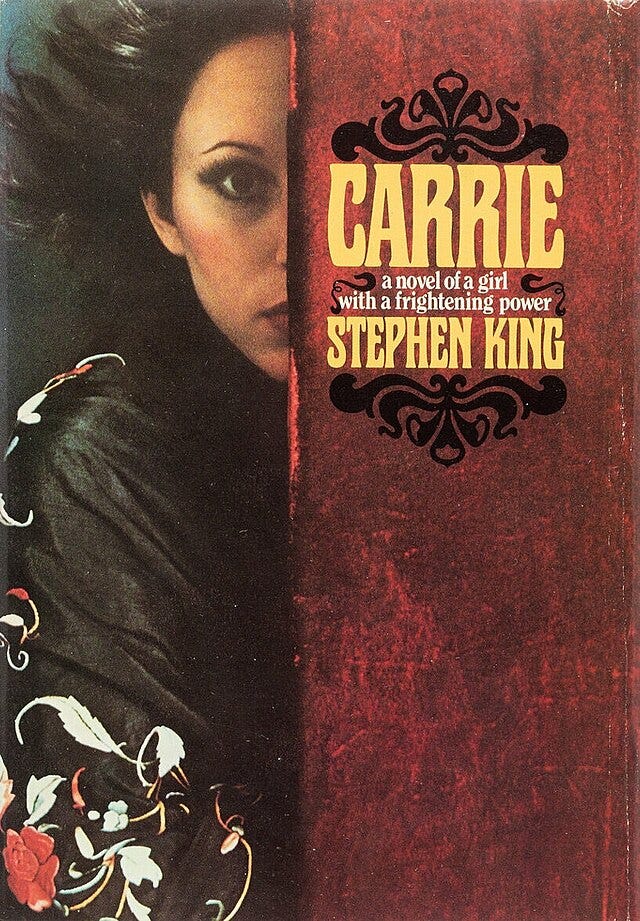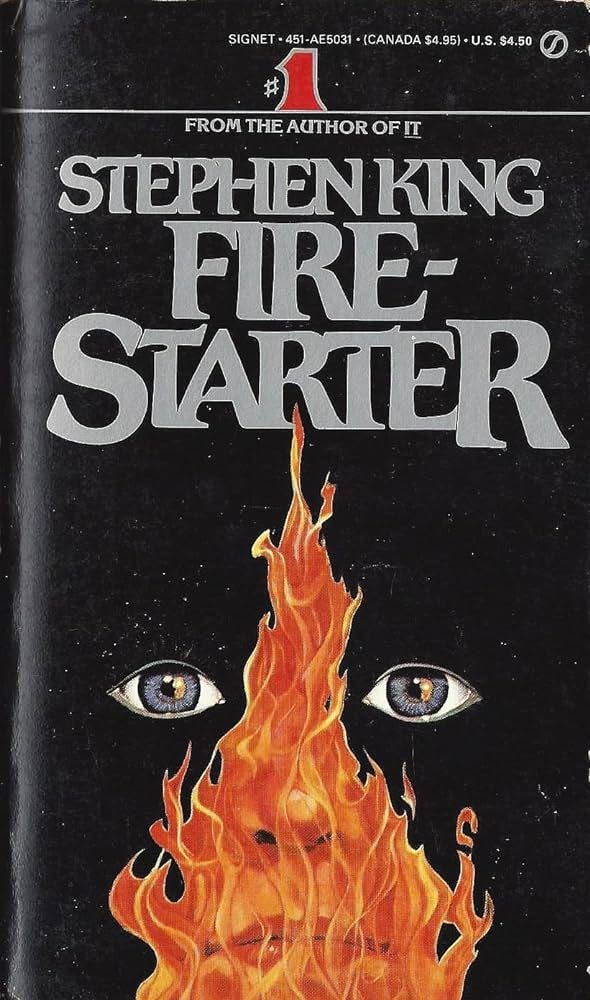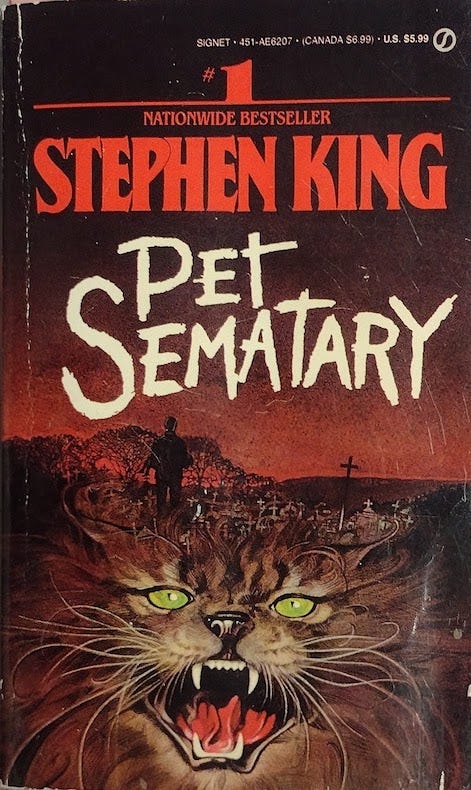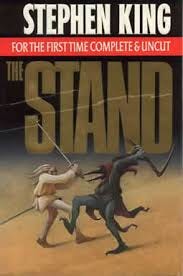50 Years of Stephen King
Unpacking my relationship to the Master of Horror on the anniversary of his first book.
50 years ago this week, Doubleday published Carrie, Stephen King’s debut novel. A fairly momentous moment in horror literature, to be sure, and also the starting point of one of the most significant and influential careers in any art form. Not to mention perhaps the most prolific - to this day, King still publishes at least one novel or short story collection a year. That he does so to somewhat diminished returns has become beside the point - as time passes and as my relationship to art in general and the media landscape in particular has developed, the presence of a steady and singular voice is frankly worth more to me than any qualitative measurement of a half a decade’s worth of output.
Maybe some of that is sentimental. It’s not an understatement to say that Stephen King is not only in large part the reason I try to write, but the reason I became the reader I did. He was the starting point, and like most people my age was my entree to more adult fare. I don’t remember exactly how old I was when I read my first King book, but I do remember that it was a signet paperback edition of Firestarter that I bought second hand at a garage sale. Or maybe it was gifted to me. I had already been reading novels by that point - once again probably like most people my age, my first was Jurassic Park. So while I was no stranger to more adult themes, grisly violence, and the cruel grasping hands of death (RIP first-novel-pre-inexplicable-resurrection Ian Malcolm), there was something about reading King that felt a bit salacious. Like I shouldn’t have really been allowed to. There wasn’t a lot that was forbidden to me at that time - I recall my mother seeing Red Dragon on a pile of spoils I brought home from a flea market once and saying absolutely not.
I remember being afraid that I would be afraid more than I was actually afraid, as it’s one of his less-frightening books. A few disparate images stuck with me: an agent of The Shop, the secret government agency chasing the pyrokinetic Charlie McGee and her father Andy, falling neck-first into a garden spike as the child unleashed her powers, chickens exploding all around him from the heat; the assassin John Rainbird waiting in the darkness for one of his targets to wake up just so he could suffocate them; Andy McGee as a young man watching a fellow test case for the experimental psychedelic whose lingering traces would curse his daughter with her unholy power tear out his own eyes and then sneaking back to confirm that it wasn’t a hallucination by finding a smear of blood on a pull-down screen; Dr. Pynchot, a minion of The Shop charged with studying Charlie once she is captured, unravelling in response to Andy’s psychic meddling and sticking his hand into a garbage disposal and flipping the switch. Truth be told, I never finished the book because Arthur Noll turned around during World History class and, seeing that I was reading it, spoiled the ending. I still haven’t gone back to it. I suppose I should but there’s also something perfect to me about it being left open as an incomplete experience.
I was hooked regardless, and while it’s a little fuzzy, I can more or less piece together the succeeding sequence of reads fairly accurately. Cujo was next, and so the above-related images were soon joined by children vomiting what looked like blood but ended up being a tainted red cereal dye; a giant bearded man vindictively masturbating all over the bed of the married woman who had broken off their affair; a rabid St. Bernard biting off a man’s genitals; and of course the ending. This was also the book that gifted me with the episode of a mailman worried that his flatulence was a sign of cancer, a tenuous connection that I myself never would have made before but which of course I would go on to make ever since. I also remember reading the book over the course of a road trip to Macinaw, my grandfather asking that I turn over the reflective cover because it kept shining sunlight directly into his eyes. I think about this every time my wife’s phone screen does the same. I’m pretty sure it was on that same trip that, once I finished reading Cujo, I bought Misery from the local bookstore.
The biggest revelation for me with Cujo though was that it was the first of King’s books I read that was set in small-town Maine. As a bored and over-imaginative kid who spent summers in the backwaters of central Michigan, this resonated. One of the features that kept me engaged with King’s writing at this point was that it felt so real. There didn’t seem to be much distance between Castle Rock or Derry and Eaton Rapids. The settings felt like spaces that I inhabited, and his characters felt the people I was often surrounded by. I enjoyed the fact that he often returned to these places and these people throughout his books1. It was perhaps this close-to-life quality that made Pet Semetary so frightening to me, because it made its horrors seem all the more plausible. I was already reading beyond my years, but I read this one far too young and it may have scarred me for life. While the darker implications and developments certainly took root in my psyche and were stored away until their true impact could be unpacked years later, it was the more superficially scary moments that got me back then. The ghost of Victor Pascow, head torn wide open, barging into Louis Creed’s room and dragging him through the woods to the titular graveyard that abuts the property of his new home; the Wendigo marching past Louis as he later brings his grim deposit to the place deeper in the woods, the sour earth that brings back to life anything buried within; the blood-chilling final chapter. I spent long nights tearing through its pages, terrified beyond all reason and yet unable to stop reading. I remained so frightened of it that I couldn’t look at the cover. I couldn’t even look at the poster for the movie adaptation that hung at the local video store by my grandparents’ house. I would put on a brave face when my childhood crush would describe scenes from the movie to me, and then curl into a ball of nerves once I was safely out of her sight. I cherish all of this as an overall formative experience - everyone should be so scarred by something at some point in their youth. When I went back to read the book years later I found it still effective even though its scares had dulled somewhat, overshadowed as they were by the depths of human despair and desperation that it so unforgivingly plumbs. Now that I have kids of my own I can’t imagine ever reading it again.
During this initial spree of digging through his back catalog I was also trying to keep up with his then-new publications. Over the course of the early summer of 1996 my mother would buy the latest serialized portion of The Green Mile and, upon finishing, send them to me to read, after which we would confer and share reactions. My grandmother, ever encouraging of my reading habits, made a habit of buying me whatever his newest book was for Christmases or birthdays. My father one time showed off my door-stopping copy of Four Past Midnight to one of his friends, presumably in a “look at this nerd” fashion (I would never have the heart to tell him that I barely made it past The Langoliers, the miniseries adaptation of which I remember somehow enthralling me at around that time even though it’s about as tense as a wet paper towel).
Eventually I drifted away. Too many disappointing books in a row, too many other authors to read, too much of a post-adolescent feeling that I was above it all. I didn’t come back until much later. I read It for the first time shortly before my first return to grad school, during a dark point in my life where I was lost and needed a link to something in my past that had once given me joy. I expected to look down at it and feel superior to it, but I was riveted, and remembered how much I had gotten from his work. It would sometimes take years, but he would always pull me back in. I finally read The Shining in 2012 or so, which only further convinced me of the superiority of Kubrick’s film version. Several years later, I was on a beach trip with my wife and family, and I needed something to read. For some reason it was a copy of Night Shift that called most strongly to me from the shelves, so I grabbed that and was entranced. I felt a little guilty to be reading such dark fare in such a sunny locale, but that also took me back to the sense of getting away with something I shouldn’t have been doing that I had felt reading him as a kid.
He’s remained more or less a constant in my rotation ever since. It’s possible that I’ve read more of him since then than I ever did previously. I read Salem’s Lot while gripped with and recovering from one of the worst sicknesses I’ve ever had. When I was between jobs and at a point where I wasn’t sure if my current career path was the one I was going to stay on, I spent money I didn’t have stockpiling hardcover editions of his work. I powered through the last half of The Stand while my wife was in the process of losing our first pregnancy halfway across the country, as it was all I could do to hold it together in between calls to and from her. I read the Bill Hodges trilogy while she was being treated for cancer, sometimes right next to her in the infusion center. There have been plenty of reading experiences not linked to intense trauma, but there is nonetheless something that brings me to him in times of emotional distress. Perhaps because he comforts me by re-connecting me with my childhood. Perhaps because Pet Semetary fucked me up so bad that I associate him with the act of coping with the horrors of the world.
He has become a comfort to me in that way, though he’s certainly got his faults and limitations. He makes me cringe as often as he delights me. While his books are often compelling studies of human nature, often dark and flawed, I don’t find them particularly frightening. The horror elements I usually find rather cheesy and laughable - The Shining tries in vain to mine chills out of party favors, fire hoses, and topiary animals, and one of my biggest struggles with It is that half of the book is about 40-year-olds running away terrified of balloons and Paul Bunyan statues (if Pennywise really wants to tap into their fears he should manifest as something truly frightening, like a rejected health insurance claim or as someone who calls you in response to a text). He’s often criticized for his endings, though that is overall a mark of his emphasis on character and atmosphere rather than plot mechanics. He has the most asinine opinions on pop culture2, and is the kind of person who sneers at anything with even the slightest artistic ambition. He has a strange relationship with the overweight, often equating obesity with moral degradation. He often seems to define characterization as assigning someone an idiotic catchphrase that they repeat every other line. And like all older, well-meaning white liberals whose primary interaction with people of color seems to be through the media, he often trades in unfortunate racial stereotyping. There’s a ton that’s frustrating or problematic about his writing, but even those elements I’ve come to accept as the idiosyncrasies of an artist who has remained unashamedly, unabashedly himself for the duration of a career that has spanned ten presidents. Like anyone who has no shame, that becomes both his biggest weakness and also his greatest virtue. It’s easy to make fun of him, but it’s that lack of inhibition that has likely fueled his longevity and prolificacy.
Some writers you admire for their sheer craft, because of their polish, their refinement, the careful curation of their life’s work. And some you hold close because what they put into the world is a direct, undiluted link to their mind at very specific points in time, and one of the virtues such a writer is that you can track their development as a person over the course of that work. In that way King becomes a case study of a specific kind of cultural figure - you can trace the progression from the young, hungry writer eager to prove his worth, through the manic, cocaine-addled frenzy of the late-70s/early-80s period; you can see where fame and his own legend start to get into his head and loosen the editorial restrictions in the particularly bloated tomes of the early 90s; and you finally get to the older, more mellow, long-sober elder statesman-verging-into-kindly-grandfather period of the last 10-15 years. King has always been a writer whose own life, whose own deepest fears and insecurities, have informed his work, but these larger trends give his life’s work a larger biographical arc. I’ve always had a soft spot for writers, filmmakers, musicians who were of the more unrefined type, for whom the “messiness” was part of the experience. It’s why, despite his flaws and as often as he sometimes makes me regret it, I’ll continue to be a faithful reader.
To an extent. The post-Dark Tower interconnectedness has to me reached a level of intricacy that I rebuke largely out of boredom with such dogmatic canonization. Any time someone starts to go on too long about the intertwined nature of his world, I get closer and closer to watching my soul fly out of my body with wings and a harp.
He had a truly embarrassing column in Entertain Weekly once upon a time in which he constantly referred to himself as Uncle Stevie and, among other topics, detailed his movie theater snacking regimen, which involved pouring Milk Duds into his popcorn and mixing/twisting the bag until the chocolate melted and combined with the greasy butter - an image of more lasting terror than anything from his books.







